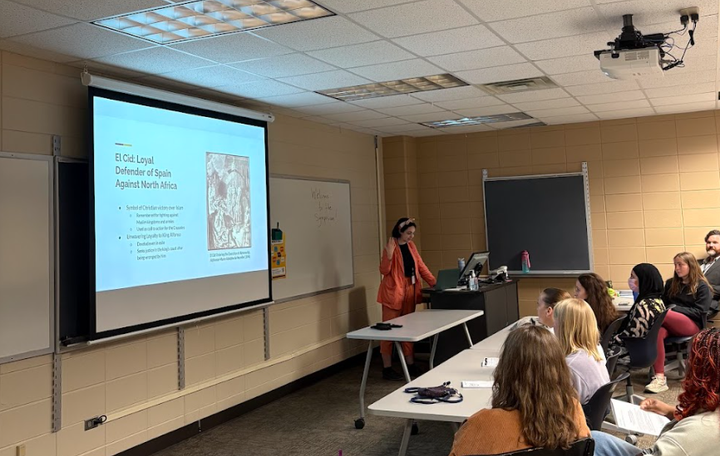Augie theatre explores ‘Medea’—Cast brings new life to old myth
It is 431 B.C., and in Athens, Greece thousands of spectators gather around a central stage upon which a small group of men weave a tale. The audience is fascinated by this dramatic story of gods, kings, betrayal and dire consequences. It is a familiar myth reimagined at the hands of the playwright, Euripides.
Almost everyone present is familiar with the myth of the Greek hero, Jason, who must travel to the “barbarian” land of Colchis and retrieve the legendary golden fleece in order to take his rightful place on the throne of Iolcos. With the help of the Colchian princess, Medea, Jason succeeds in this impossible task.
However, this story, Jason’s story, is not the one Euripides is telling. Euripides’s story tells of a young woman who is convinced by a foreign man to betray her family and homeland and go away with him. It tells of how she sacrificed everything, married and bore this man two children.
This story describes the subsequent pain and betrayal this woman faces when this man leaves her for the young and wealthy princess of Corinth. This is the story of Medea. The new point of view Euripides presents is shocking and sincere, and leaves a lasting impression on the massive Greek audience.
As a result, much later — 2,450 years later — people are still talking about it.
On Sunday, Feb. 14, 2020, the Augustana University Theatre read and discussed a section from a new production of Euripides’s Medea that has been translated from its original Greek by Augustana’s very own professor Richard Swanson and directed by theatre professor Jayna Fitzsimmons. The play is still in its workshop phase — a stage that Augie senior and actor, Kale Hellman, described as “a time for the playwright or translator as well as the director to get a feel for how the language is going to work.”
What is being read in three parts over Zoom from 2:30 to 3:00 p.m. on Feb. 14, 21 and 28 is the current script for a play that is still in the works.
“It offers an opportunity for them to decide, ‘okay, is this flowing properly? Are the ideas being conveyed, and how can we make this understandable to a contemporary audience?’” Hellman said.
This is a rare opportunity to get an inside look at the process of creating a play, to hear a new take on a brilliant story and to ask questions of those involved.
The portion of the play read on the 14th featured the first argument between Jason and Medea. In this scene, Jason insists that Medea is foolish to be angry with him. Rather, Jason asserts that Medea should be grateful for all he has done. Medea retorts with evidently greater wit, discrediting Jason’s claims and justifications.
The lack of costumes and a stage did not hinder the actors’ ability to bring the scene to life. Hellman, who read for Jason, used pauses, smirks and gestures to embody Jason’s arrogance and egotism. Meanwhile, senior Mariah Mantz, reading for Medea, visibly fumed, rolled her eyes and scowled.
When Medea finally gets her chance to speak, Mantz portrayed Medea’s determination through a venomous tone and pointed gestures but also expressed Medea’s underlying desperation and sorrow through moments where she grew more quiet and seemed on the verge of tears.
All the while, the four chorus members present a wide range of expressions, giving the audience some insight into how to interpret what is being said.
The dialogue itself is a point of fascination.
“It takes a sympathetic approach towards Medea’s plight as both a woman in a very patriarchal society and as an immigrant in a very zenophobic society,” Augie junior and member of the chorus, Sky Nockels, noted.
Euripides depicts traditional stories in a way that highlights people who are often disregarded and tears down those who are often portrayed as heroes. Euripides creates depictions of humanity that are, at times, ugly and crude. He does not shy from controversy or novelty.
Swanson capitalized on this aspect of Euripides’s work in his translation. Swanson took into consideration the context, connotations and culture that is behind every word while reproducing this text.
The result is a translation that is more true to what Euripides intended. Swanson’s script is blunt and unfiltered, giving new meaning to many scenes and statements and inspiring greater reactions and reflection.
“Words don’t mean, they do,” Swanson said.
It is Euripides’s determination to explore social and human conflicts and to depict life in all its awful glory that has caused this play to continue to be relevant today. During the discussion session following the reading, numerous people expressed their surprise at how closely the characters resemble people they are familiar with in their own lives.
“I think his characters are honest, and that is something that doesn’t always come across, especially in pieces that are older: that people have always been the way that they are and they continue to be that way,” Hellman said of Euripides.
If nothing else, Medea portrays the power of point of view and the complexity of evil. Despite the fact that Medea carries out a series of merciless murders at the end of the play (including those of her own children), both Nockels and Hellman consider Medea the protagonist, and the audience members seemed to agree.
It takes a complicated and artful story to accomplish a feat like that.
A story that, thanks to the efforts of Swanson, Fitzsimmons and the Augustana Theatre students, people from all over the world are able to delight in and discuss.



